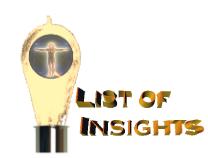
The ancient dictum: "Know thyself!" now echoes throughout the halls of consumer marketing. TV shows, radio shows, conferences, books, magazines, tapes, and various paraphernalia are offered so we can learn about ourselves and fix the problems in our lives. All this attention has benefits: the word is out that many who suffer need not feel hopeless, people are aware of what is possible in their circumstances, there is social support for change, and there is greater acceptance for those who seek appropriate help.
There are also limitations on the help that comes from public sources of broadcasted wisdom. Although knowledge is a powerful tool, tools can be used in ineffective or even harmful ways. Another echo from the past is this: "A little knowledge is a dangerous thing."
Perhaps the biggest single gain from the proliferation of self-help materials is the wide recognition of emotional suffering. Whether you find yourself struggling with universal problems or with more rare circumstances, you now know you are not alone. There is help and hope for a better life. There are examples of others who overcame similar challenges. There is information to share with those who surround you. This can be enormously heartening when trapped in despair.
But questions remain. Which problem is really mine? What can I do? Whom should I follow? Am I living up to what others expect? Impersonal sources cannot answer these questions. Neither can those who lack adequate training.
One difficulty introduced by self-diagnosis is that we readily seize upon the ordinary words that professionals use in very peculiar ways to describe symptoms and syndromes. Although these words might describe anyone in everyday English, mental health professionals familiar with the range of human experience assign specific meanings to them. As a result, the average audience is liable to jump to the hasty conclusion that such descriptions fit their life circumstances. More confusion results because the same apparent indications can belong to very different problems. Misidentification of problems also stems from our limited ability to view ourselves as others know us. Furthermore, our preference for immediate relief prompts us to chase frantically after any promise.
Once identified, problems beg many competing strategies in pursuit of a remedy. If we try one of these without satisfaction, we can become too discouraged to use a more effective solution. If a healing process takes more time to work than we expect, we can become impatient or blame ourselves. If people who are important to us are affected by our turmoil, they can become angry when highly touted advice proves fallow. Perhaps the most pernicious illusion of the self-help culture is the assumption that all problems can be solved by individual effort alone.
The human change process often requires a social context. We learn by imitation, our attitudes are shaped by reference to peer groups and our self-regard is profoundly influenced by the evaluations others make. We need feedback to know the effects of our behaviors. There are times when we need self-acceptance more than self-improvement. Nobody can produce such a remedy in isolation. Self-help has its place, but there are times to look to others for real help.
